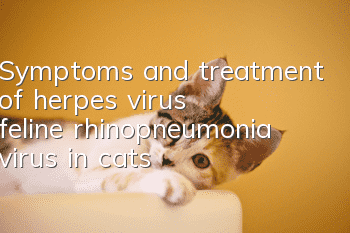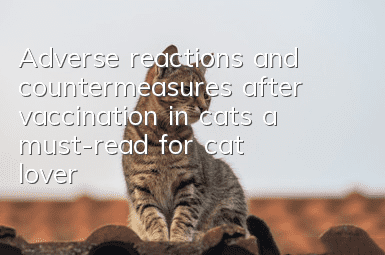Symptoms and treatment of herpes virus (feline rhinopneumonia virus) in cats

Feline herpes virus is a highly contagious pathogen that causes acute upper respiratory tract infection in cats. It mainly causes upper respiratory tract symptoms, so it is also called feline rhinopneumonia virus. Feline herpes virus has a high risk of infecting young cats. The rate and mortality rate also reached 50%.
The initial symptoms of herpes virus in cats are mostly "cold" symptoms, such as sneezing, runny nose, tearing, etc. When the disease progresses to a certain extent, symptoms such as rhinitis, conjunctivitis, keratitis, and pneumonia will appear. In a few cases, Facial ulcers or erosions. Feline herpes virus has only one serotype, and it only replicates in the mucous membranes near the body surface. The mucosal temperature in these areas is lower than the body temperature, which is suitable for the replication of this virus. Herpes viruses cannot replicate in the body. The virus is spread through contact or droplets. After infecting an animal, the virus hides in the animal's ganglia and cannot eliminate itself. This is the reason why animals carry poison for a long time. Kittens with weak immunity and cats with immunodeficiency may become acutely ill. Cats that recover can become chronic carriers of the virus and become potential sources of transmission.
Regarding the treatment of herpes virus rhinitis, pneumonia, dermatitis, and conjunctivitis, different doctors have different methods. But they are all inseparable from the following therapies:
1. Supportive therapy
In most cases, cats suffering from feline herpes virus disease lack appetite, and placement of a gastric feeding tube is the best option. Clinically, it is often necessary to stay for more than 1 week. For cats with mild symptoms, diazepam and cyproheptadine are good choices. With an intravenous bolus of diazepam, cats can even eat immediately.
2. Antiviral treatment
Omega interferon, ribavirin, famciclovir, feline herpes virus antibodies, L-lysine, etc. all have good local and systemic antiviral effects.
3. Symptomatic treatment
Most infected cats have inflammation of the eye conjunctiva and even corneal ulcers. Eye damage can be adequately controlled using iodine cyanosis, omega interferon, etc. The prognosis for feline herpesvirus disease is mostly good, although it may seem troublesome at first.
The herpes virus in cats can cause immune stomatitis. Many cats have lost their teeth as a result and have been orally administered a lot of megestrol. One cat that eats the most eats more than ten tablets a day, but it still drools. Stopping will not cure this problem.
For immune stomatitis in cats, the first treatment method is hormone therapy. The effect of hormone treatment on immune oral diseases will be more obvious in the early stage. As the course of the disease prolongs, the condition will worsen. The dosage and frequency of medication used will increase, and the effect will be difficult to maintain in a good condition for a long time. Depending on the cat's condition, the veterinarian will use different medications for treatment. Generally speaking, after using antibiotics (anti-inflammation) and hormone drugs (reducing immune response) for a few days, the cat's pain will subside and he can resume eating. After this situation continues for a period of time, the cat will be unable to eat normally again.Then you need to go for treatment again. There is also a long-acting hormone, which can last for 1-3 months after one injection. However, some cats are not very effective with any medicine. It should be noted that hormonal drugs will put a burden on the cat’s organs and make the cat dependent on such drugs. Once you start using them, you cannot stop them. But for immune oral diseases, if tooth extraction cannot relieve the cat’s oral symptoms, then hormonal treatment can only be used to maintain the cat’s normal life. For specific medication, it is recommended to consult a veterinarian and use it according to the cat’s condition.
In terms of other treatment methods, we can also give cats a tube of polymyosine injection orally every day. This is a drug used by humans to treat herpes viruses. It is colorless, odorless and very palatable. It can be mixed in cans or Give it directly to cats orally, and generally use it for about a week. It is especially effective for complications caused by nasal discharge and conjunctival fluid. The above can basically quickly suppress the symptoms of stomatitis, and can control the redness and swelling of the gums, ulcers, redness and even small blisters in the throat.
In addition, you should pay attention to the cat's diet in daily life. In the early stage of the pain, there will be symptoms of red and swollen gums, which will gradually develop into a wait-and-see behavior without eating. In the final stage, there will be mouth pain, whining and drooling, etc. Be sure not to wait until the final stage to give treatment. If symptoms are discovered, treatment should be given according to the above prescriptions, but the dosage of long-acting hormones should be reduced. Give your cat a liver and kidney function test regularly every year to avoid organ damage caused by hormones.
For cats infected with the herpes virus, they must first be isolated and kept at a higher ambient temperature than normal, which can inhibit the replication of the herpes virus.
- 5 reasons why cats lick their fur
- How to cultivate good eating habits in pet cats, collected by the shit shovel official!
- Why does my cat have bloody nose?
- Why does the cat bite the quilt?
- Characteristics of cat tongue
- Can a cat sense that its owner is pregnant?
- Can cats have food allergies? Common symptoms of cat allergies
- How to choose and clean your cat’s litter box
- How to help kittens with constipation defecate
- Can cats eat fruit?



